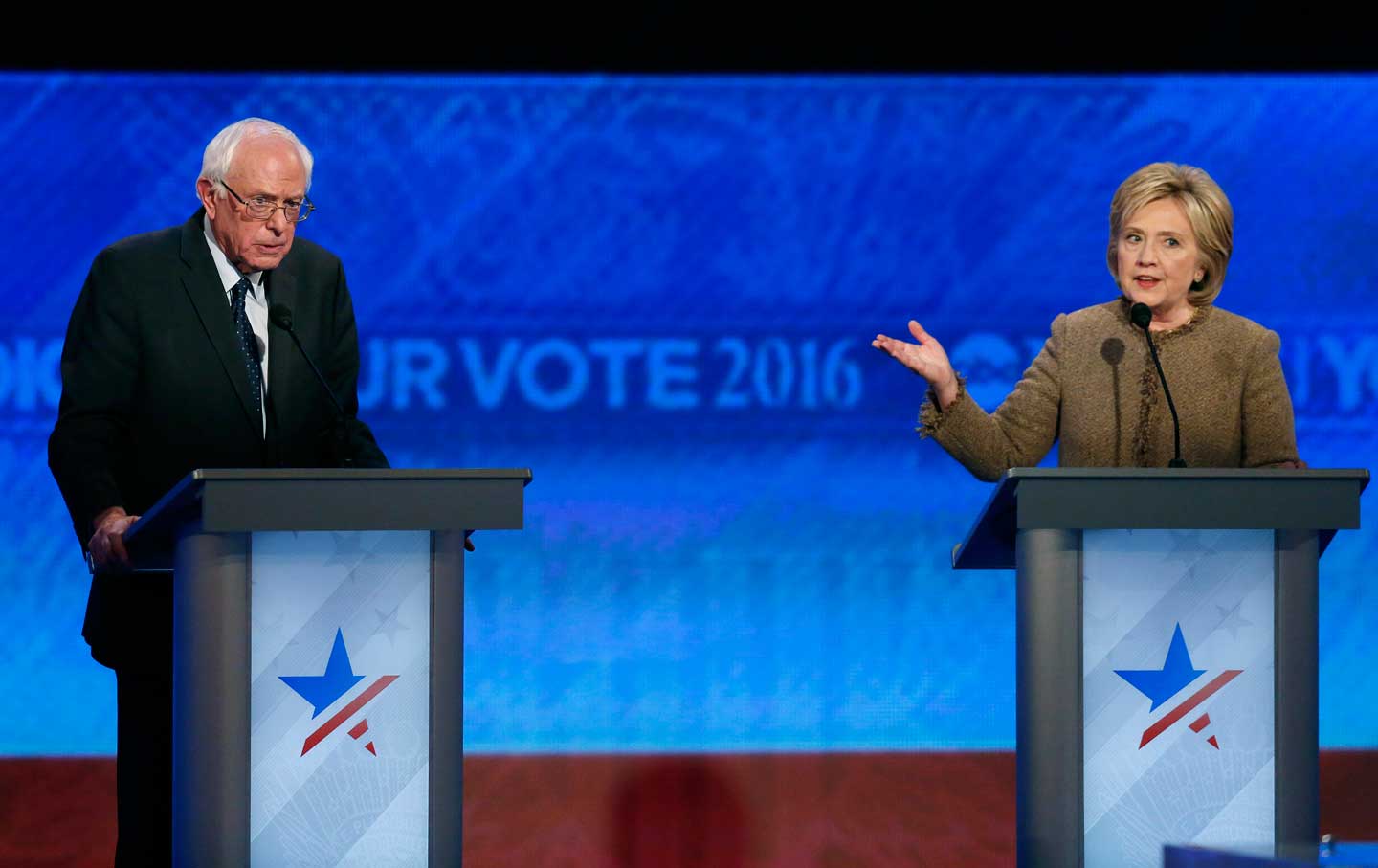Their debate was a welcome contrast to GOP bombast and bigotry—but in scheduling it at an inconvenient time, the DNC seemed determined to protect front-runner Hillary Clinton.
The Editors
Bernie Sanders and Hillary Clinton during the Democratic presidential primary debate, Saturday, December 19, 2015, at Saint Anselm College in Manchester, New Hampshire.(AP Photo / Jim Cole)
The Democratic debate in New Hampshire on December 19 provided a stark contrast to the GOP’s “Fear and Loathing in Las Vegas” spectacle a few days earlier. The Republicans dished out bombast and bigotry, while the Democratic candidates focused on policy and purpose, reminding Americans that we are strengthened when we abide by our constitutional values rather than trample them in panic.
Sadly, far fewer voters watched the Democratic debate, which drew a little over 8 million viewers, as opposed to some 18 million for the GOP. This imbalance was the perverse design of Democratic National Committee head Representative Debbie Wasserman Schultz, who knew that scheduling a debate on the Saturday night before Christmas—at the same time as an NFL game—would discourage viewers from watching. By planning only a few debates at inconvenient times, she is in effect protecting front-runner Hillary Clinton. This is a disservice to the country and to Democratic voters.
Wasserman Schultz compounded this disgrace by overreacting to a breach of Clinton voter data by some Sanders staffers, cutting off his campaign’s access to its own lists. The Vermont senator had to file a lawsuit to regain access. Even though few outside the Beltway knew or cared about the breach, it framed the first question that the debate’s moderators posed—a striking display of the corporate media’s preference for scandal over substance.
As for the rest of the evening, terrorism and ISIS took precedence. The foreign-policy portion featured no questions on climate change—though the debate was held soon after the historic Paris accord—or on China, the crises threatening the European Union, or the sluggish global economy. Even so, there was serious disagreement. Sanders challenged the bipartisan assumption that the United States should police the world and questioned Clinton’s predilection for regime change. Clinton insisted that the country must not only take on ISIS but should also dislodge Syrian President Bashar al-Assad and “go after everything from Northern Africa to South Asia and beyond.” Sanders’s reply was forceful: “The United States must not be involved in perpetual warfare in the Middle East.”
The conventional pundit wisdom is that Clinton, the most experienced candidate, will benefit as voters grow more concerned about national security and terrorism. But experience is a mixed blessing: As both Sanders and former Maryland governor Martin O’Malley noted, Clinton’s support for regime change has been costly. As a New York senator, she voted in favor of George W. Bush’s invasion of Iraq, a disaster that destabilized the entire region and led to ISIS’s rise. She championed not only humanitarian intervention in Libya but also Moammar El-Gadhafi’s overthrow. Now that country is wracked by civil war, with ISIS taking advantage of the chaos to establish a base there. But the former secretary of state gives no sign of having learned from these debacles; instead, she advertises herself as more interventionist and hawkish than President Obama.
The difference in worldview is expressed in the candidates’ conflicting strategies on how to deal with ISIS. Sanders favors forging a grand coalition—including Russia—to defeat the terrorist group, which is attacking us, rather than Assad, who is not. And he argues that since this is, in part, a fight for the soul of Islam, regional forces—not Western troops—“should lead the effort on the ground.” Clinton agrees that Arabs should lead the ground war against ISIS but insists that we take on Assad at the same time. And she rejects a grand coalition with Russia, proposing instead a no-fly zone in Syria, to be enforced against not just the Assad regime but its ally Russia as well—though she doesn’t explain what gives Washington the legal authority to occupy part of Syria and shoot down its planes. She suggests that a no-fly zone will give Washington “leverage” with the Russians and will somehow be accepted by them. It’s more likely to subvert the fragile cease-fire talks now under way after a unanimous vote shepherded through the UN Security Council by her successor, John Kerry.
A version of this argument about regime change and the US role in the world also occurred during the GOP debate. On both sides of the aisle, the failures of interventionism are sowing doubts, even as war-weary Americans are alarmed by the terrorist attacks in Paris and San Bernardino. Let’s hope the media give this long-overdue debate more attention than they do to the Beltway’s next pseudo-scandal.
The Editors